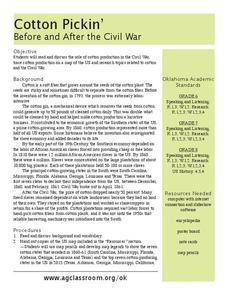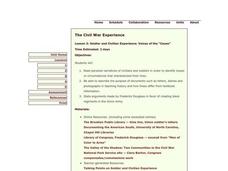Curated OER
Cotton Pickin' Before and After the Civil War
Young scholars explore the impact of cotton. In this economics lesson, students listen to a lecture presented by their instructor on the Southern crop of cotton and its impact on the South prior to and following the Civil War. Young...
Curated OER
Civil War Photographs
Eighth graders explore the new technology brought on by the Civil War. In this U.S. History instructional activity, 8th graders examine photographs and drawings that depict the changes that happened as a result of the Civil War,...
Curated OER
FOCUSING ON CIVIL WAR HISTORY & INFORMATION SEEKING
Students use a Web resource to obtain information on a specific subject; study the nature of naval warfare and commerce raiding during the Civil War; and assume the identity of a participant and viewing the events of the era from that...
Curated OER
The Civil War in Art and Literature
Students examine art related to the Civil War. They participate in activities that allow them to write poetry and drawings. They create their own journal and collect their work in a binder.
Curated OER
Slavery in America at the Time of the Civil War: Navigating a Website
Young scholars discover how to navigate websites. In this Civil War lesson plan, students conduct research on slavery as they visit a website to experience oral, written, and digital texts and performances by slaves from the Civil War era.
Teaching Tolerance
The War on Drugs—Mechanisms and Effects
The war on drugs doesn't have definite results. An interesting lesson examines the social, political, and economic effect of the war on drugs. Academics learn how the war on drugs has led to mass incarcerations and negatively affected...
PBS
Think Like a Historian: A Viewing Guide
Calling all junior detectives! Scholars use the tools of investigation to determine the causes and impacts of the American Civil War. Using viewing guides, videos, group research, and written resources, they discover what it takes to...
Curated OER
Causes of the Civil War: Missouri Compromise, Compromise of 1850 and Kansas Nebraska Act
How did the Missouri Compromise, the Compromise of 1850, and the Kansas-Nebraska Act contribute to the growing tensions that led to the Civil war? To better understand the events that led to the Civil War, young historians engage in a...
Curated OER
African American Life in the Pee Dee Before the Civil War
Third graders examine the life of the African American in the Pee Dee region during slavery. For this slavery lesson, 3rd graders explore primary and secondary documents related to the topic and create a timeline of when slavery...
Curated OER
The Civil War Experience
Eighth graders study the Civil War. In this Civil War lesson, 8th graders read and analyze primary sources. Students complete handouts in relation to the primary sources.
Curated OER
Freed Slaves
Students are given the identify of a newly freed slave at the end of the Civil War. Students participate in a discussion to explore some of the difficulties and decision making freed slaves had to consider. Students present their...
Curated OER
Who Led the South?
Eighth graders explore the role of Jefferson Davis and his leadership of the Confederacy during the Civil War. They examine the command system used in the Confederacy and analyze the effectiveness of the command system.
American Battlefield Trust
United States Colored Troops
The debate over slavery contributed to the Civil War, but it didn't stop African Americans from joining the military. Academics complete a series of worksheets, read original letters, and analyze a photo of an African American soldier to...
American Battlefield Trust
Fredericksburg 360
Urban combat long preceded today's video games. Pupils today experience the battle of Fredericksburg—a major Civil War engagement in an American city—using a 360-degree interactive app. Users explore the battlefield online, using a...
K20 LEARN
Reconstruction Treaties Of 1866: The Reconstruction In Indian Territory
The Reconstruction Treaties of 1866 and their impact on the Five Tribes in the United States Civil War are the focus of a lesson that asks young historians to consider how these treaties affected tribal sovereignty. Class members do a...
American Battlefield Trust
John Brown
How did the raid on Harper's Ferry contribute to the start of the Civil War? Curated for high school historians, the activity explains John Brown's contribution to the start of the Civil War by using violence to demand an end to slavery....
Curated OER
The Home Front
Young historians explore life on the home front during the Civil War with primary documents and a series of writing prompts. They also watch a presentation and use a worksheet to compare how communication methods have changed over time....
Curated OER
Remembering the Fallen
A thought-provoking lesson showcases Civil War battlefield monuments to demonstrate how fallen soldiers are remembered. High school scholars compare Union and Confederate monuments to learn how each group commemorated the battles. They...
Curated OER
1863: Shifting Tides
The victory at Gettysburg is forever immortalized in the famous speech given by Present Abraham Lincoln. Designed for secondary pupils, an interesting lesson plan explains how 1863 was a pivotal year for the Union. Academics explore the...
American Battlefield Trust
Jeremiah Handley
Designed for middle school scholars, a instructional activity explores the life of Jeremiah Handley, a young man when the Civil War broke out. Pupils read Handley's personal story, accounts of battles, and view images to understand what...
American Battlefield Trust
Pre-1860: Disunion
Using personas ranging from freed African Americans to wealthy plantation owners, young historians consider various points of view around the events in the days leading up to the Civil War including major milestones such as the Dred...
Curated OER
The Emancipation Proclamation Through Different Eyes
Students examine how various segments of the American population viewed the Emancipation Proclamation. They read the Emancipation Proclamation, analyze key terms and statements in the document, and participate in a debate.
School Improvement in Maryland
Court Proceedings Civil Cases
What's the difference between civil and criminal law? How do the court proceedings differ in these two types of trials? How do the standards of proof differ? Why do these differences exist? As part of their examination of the...
Carolina K-12
African Americans in the United States Congress During Reconstruction
The Civil Rights Act of 1866, which granted citizenship to all males in the U.S., resulted in the first African Americans to be elected to Congress. Class members research 11 of these men, the challenges they faced, and craft...

























